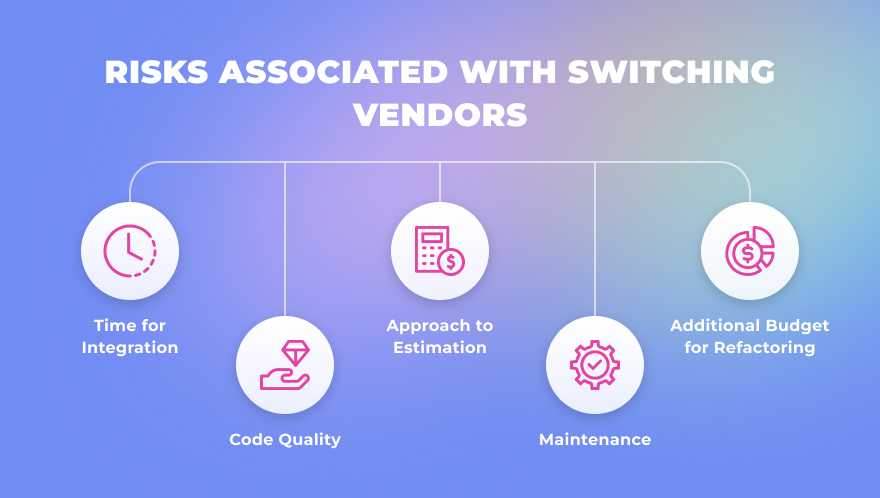When you outsource software development, finding a reliable software vendor is key to success. However, with the passage of time and advance of your cooperation with a chosen software vendor, you might feel disappointed for a dozen of reasons. At some point, you might consider changing a software development company.
But are you sure that such a radical move will solve your problems? Switching to another contractor in the middle of the software project is a serious challenge. It makes sense to initiate such changes only if you are totally sure that it would bring benefits to your project instead of creating even more problems.
This article will help you make a weighted decision. There are a lot of aspects that can impact your software development project due to vendor changes, and you need to carefully assess to understand what will be the best action plan in your case.
Why Should You Think about Replacing Software Development Company You Nave Already Cooperated With?
In our opinion, the answer is quite straightforward. If you’re not satisfied with the quality or communication of your existing vendor, sure, it’s a sign to look around for another custom software development company to deliver your project. The custom software development market is saturated, and you will be definitely able to find a development partner with high standards of work.
However, if your main goal is to save the budget, you have a big chance to run into problems.
Often your environment might tell you that your current vendor is overpriced and someone can release the project much faster/cheaper. However, you should ask an important question: why is another vendor faster or/and cheaper? Do they sacrifice quality for a rapid development process? Or maybe, did they give you a very rough estimation that won’t correspond with a real timeline?
Keep in mind that underestimation of the project scope and the timeline will lead to rescheduling the whole project development, and this will affect your budget.
Unfortunately, statistics say that 97% of software outsourcing companies aren’t qualified to deliver the quality you need, so you should assess every potential vendor extra carefully to avoid partnerships with unreliable providers.
Factors to Evaluate When Choosing a New Development Partner

So, if you are still considering changing software vendors, here is a list of risks you need to be aware of.
Time for Transition Process with a New Software Development Team
Your ideal development team should include key knowledge holders like business analysts, project managers, and tech leads. Most probably, your current vendor has all of these specialists and is very dipped in the topic of your business, and that allows them to manage load, prioritize tasks and utilize resources properly.
So for example, the specifications writing and approval process will take less time now than at the beginning of the project. A new development team might require months to be integrated. This means additional cost and a longer project duration.
Quality
Here at Altamira, we keep an eye on the code quality. We have a tool that shows the unit tests coverage of the code, and things to update or refactor.
What you can do when considering switching vendors? You can request from your previous vendor the analysis of the current code state. If it’s good, the new vendor needs to follow it. If the situation is worse, then, at least you’ll inform the new vendor about it. That will be useful while assessing the risks.
We had an example with the client when someone from their close environment told them that they can do the same scope of work two times faster and moreover cheaper. At that point, we were very close to the final release and just one-two sprint (2-4 weeks) was left to deliver the last scope.
However, even after weeks of explaining the risks and negotiations, the client decided to rely on a new advisor and make a release with the new software development partner. What we know is that more than 6 months passed and unfortunately the release didn’t happen.
Estimation Is an Important Project Stage
Before taking the project, each team needs to estimate the efforts based on the request, whether it’s adding new features, improvements, refactoring, etc.
The accuracy of your time and cost estimation can either ruin or ensure the project’s success.
Each project is unique, and without knowing the source code and patterns, no one can be fully confident and commit to their estimation. If they do so, it is a high chance of upsales and change requests.
At the first glance, a task may seem simple and straightforward, however, to estimate it properly, the software developers need also to consider which changes needed to be made first in the code to make it work.
Additional Budget for Refactoring
Quite often, new teams suggest rewriting everything from scratch, choosing different technologies, or refactoring the code. Sometimes, it happens because they just got used to the different coding approaches, or they don’t support the same tech stack as the previous team. So you might get into such a situation and spend extra budget following instructions of the new company.
If the new team plans to update existing code or do refactor, and it wouldn’t work out, you might need to contact your old vendor and ask for help. Depending on the code changes made, that might require significant efforts for an old vendor to find the problem and refactor the code again.
Besides, the same resources that retained knowledge probably won’t be available anymore, which means that even old vendors will need time for integration into the project.
On top of that, the rates might also change, and it’s unfortunate, but you might be even more distressed after hearing such news.
Weighted decision
At Altamira, we support freedom of choice and the idea that our client might decide to switch the vendor or have his own in-house team to maintain or extend the application. Such action is need to be planned, and normally 30-60 days should be enough to complete the scope, test, release, and onboard the new team.
Another thing to recommend is that if you plan in the future to switch the vendor or hire your own in-house team, you can think about hiring your own CTO to retain project knowledge. This person will be responsible for onboarding new roles, teams, and specialist selection.
Maintenance
The other option is to purchase one of our maintenance packages in order to have post-launch support while you’re trying the market. If your software is well-maintained it also means that the cost of adding a new feature will be easier and cheaper.
The same team will support your product and even for cost-saving measures we can cover development and maintenance activities in one budget. That will allow you to respond to ever-changing market needs, without the need to increase your spending.
In Conclusion
Switching from one custom software development vendor is a challenging process, so you should be absolutely sure that such changes are well-thought.
Hence, take your time before making any decisions, explore your options, and evaluate risks and possible scenarios.
FAQ






